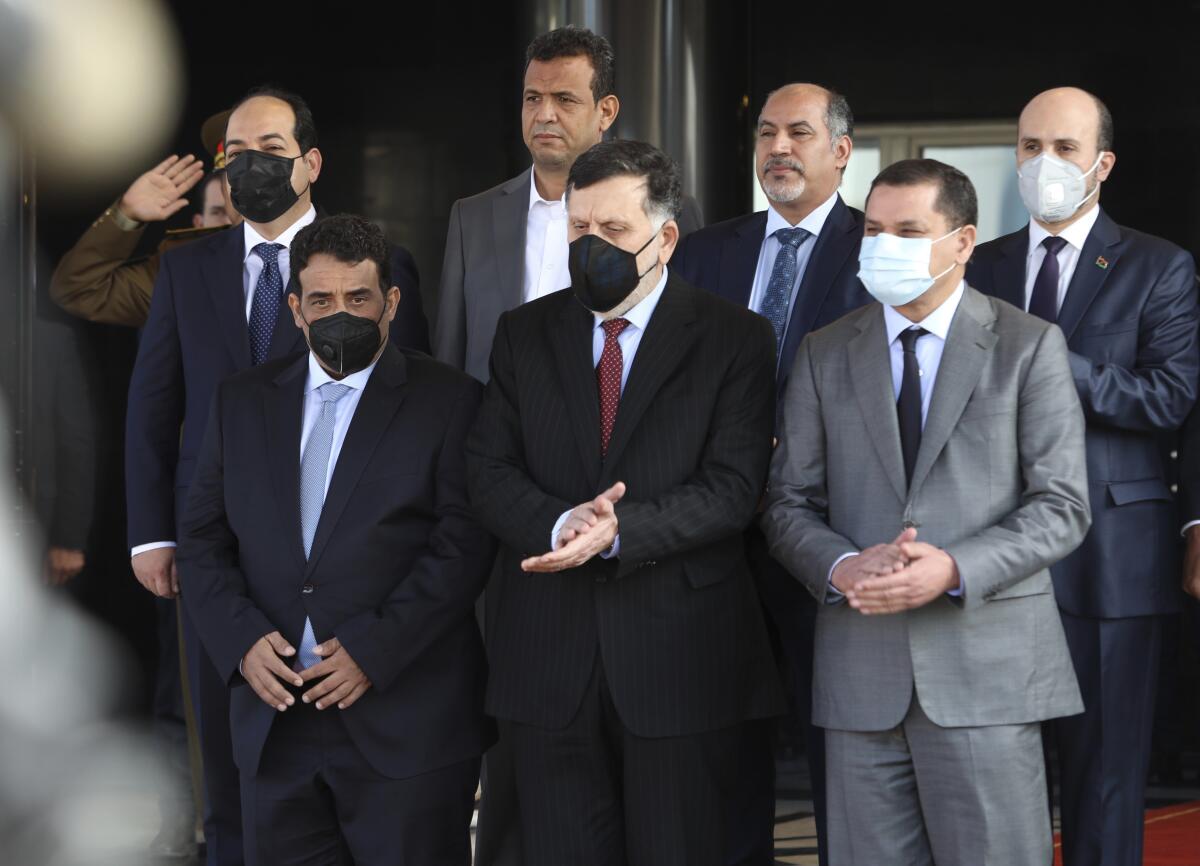Interim Libya government assumes power after smooth handover

- Share via
BENGHAZI, Libya — A transitional government in conflict-stricken Libya took power in the capital, Tripoli, on Tuesday, officially beginning a tenure designed to end with democratic elections late this year.
Fayez Sarraj, head of the outgoing United Nations-supported administration in western Libya, transferred power to Prime Minister Abdul Hamid Dbeibah and Mohammad Younes Menfi, who chairs a three-member Presidential Council.
The ceremony in Tripoli came a day after Dbeibah and his cabinet were sworn in before lawmakers and Libya’s top judges in the eastern town of Tobruk. Lawmakers had already endorsed the interim government last week amid international pressure to implement a U.N.-brokered political roadmap. That roadmap, agreed to by a U.N.-picked Libyan political forum last year, set Dec. 24 for general elections in the oil-rich country.
The endorsement of Dbeibah’s cabinet by the parliament came amid allegations of corruption at meetings of the the U.N.-led political process that appointed the interim government. Dbeibah has denied the allegations and called on the U.N. to reveal details of its investigation into the accusations.
A U.N. panel of experts determined that at least three participants at the political forum in early November were offered bribes to vote for an unnamed candidate for prime minister. The experts’ report released Tuesday did not name the forum members or the candidate.
The participants who were reportedly involved “were categorical in their rejection of the bribes,” the panel said. The issue received media attention at the time, and the Libyan attorney general’s office received complaints from members of the forum and civil society groups, the panel said.
The panel said it doesn’t envisage “any further reporting on the issue,” referring U.N. Security Council members to additional details on the allegations in a confidential annex to the 548-page report.
Tuesday’s unexpectedly smooth transfer of power is seen as an important step to end the chaos in the North African country. The lack of a proper handover among legislators in 2014 was a major factor in the split of Libya’s institutions.
“Today is yet another historic day for Libya,” Claudia Gazzini, a Libya expert at the International Crisis Group, said of Tuesday’s handover. The interim government, however, would face huge challenges, mainly avoiding political impasse or a relapse of war, she said.
The presence of thousands of foreign forces and mercenaries is another major challenge. The U.N. Security Council last week called for countries with troops and mercenaries in Libya to withdraw them “without delay.”
The U.N. has estimated that there are 20,000 foreign fighters in Libya, including Syrians, Turkish, Sudanese and Russians brought to the country by the rival sides.
Libya was plunged into chaos when a NATO-backed uprising in 2011 toppled longtime ruler Moammar Kadafi, who was later killed. The country was in recent years split between rival east- and west-based administrations, each backed by armed groups and foreign governments.
More to Read
Sign up for Essential California
The most important California stories and recommendations in your inbox every morning.
You may occasionally receive promotional content from the Los Angeles Times.













